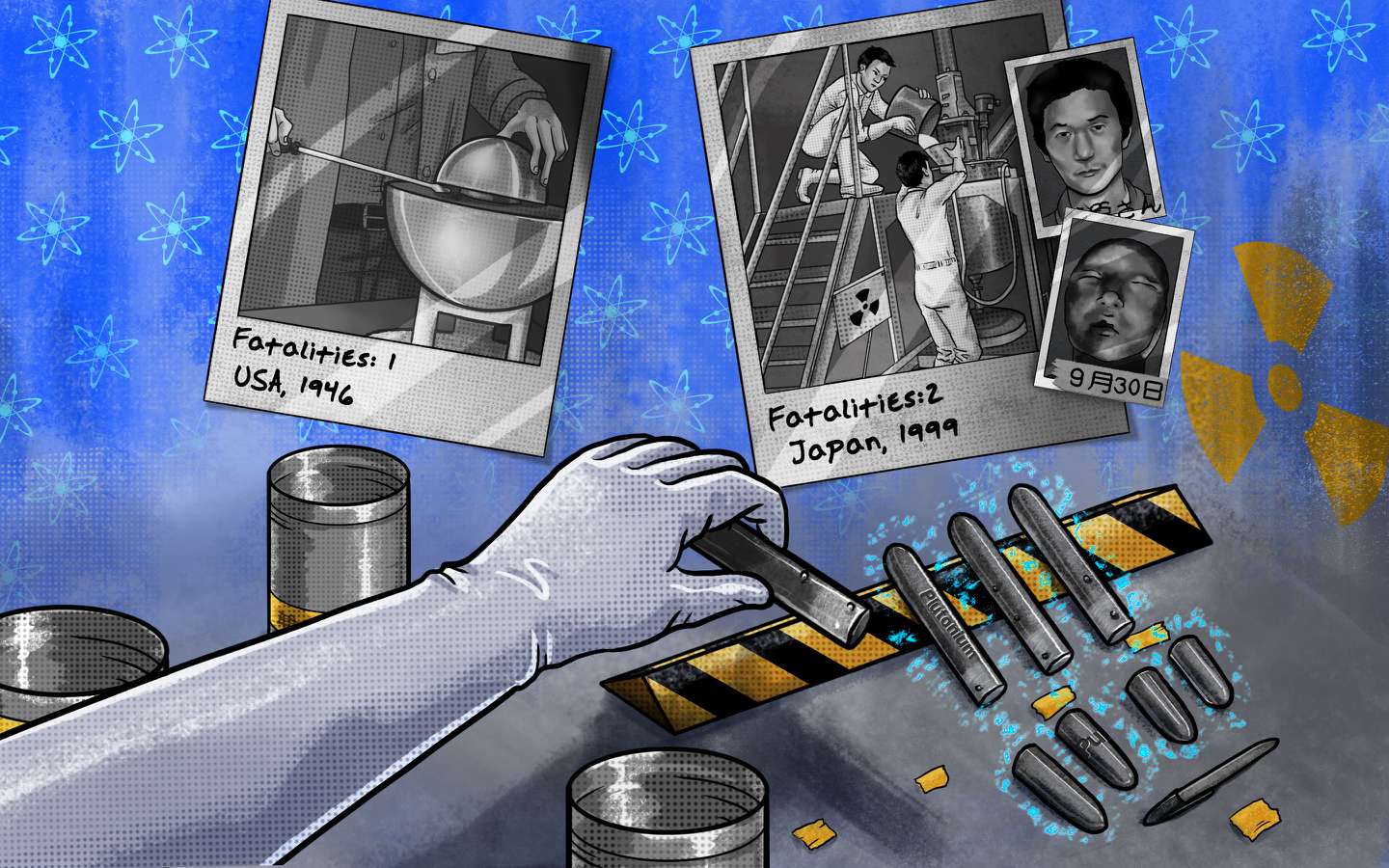Understanding The Landscape Of Nuclear Litigation Today

Table of Contents
Types of Nuclear Litigation Cases
Nuclear litigation encompasses a wide range of legal disputes stemming from various aspects of nuclear technology and its applications. Understanding these different types of cases is essential for navigating this complex area of law.
Reactor Accidents and Related Injuries
Lawsuits arising from nuclear power plant accidents are a significant component of nuclear litigation. These cases often involve claims for personal injury, property damage, and significant economic losses.
- Examples of past cases: The Chernobyl disaster and the Fukushima Daiichi accident have resulted in countless lawsuits, setting precedents for future cases.
- Legal challenges in proving causation: Establishing a direct causal link between radiation exposure and specific health issues can be extremely challenging, often requiring extensive epidemiological studies and expert testimony.
- Complexities of radiation exposure claims: Determining the level of exposure, the long-term health effects, and the appropriate compensation can be incredibly complex, involving sophisticated scientific analysis.
- Role of expert witnesses: Expert witnesses in radiation biology, epidemiology, and nuclear engineering play a critical role in these cases, providing crucial evidence and analysis.
Nuclear Waste Disposal and Environmental Contamination
The storage, transportation, and disposal of nuclear waste present ongoing legal challenges. Lawsuits often focus on the environmental impact of these activities and potential contamination.
- Cases related to groundwater contamination: Leaks from nuclear waste storage facilities can lead to significant groundwater contamination, resulting in lawsuits from affected communities and individuals.
- Challenges in proving long-term environmental damage: Assessing the long-term environmental consequences of nuclear waste disposal can be difficult, requiring complex modeling and predictive analysis.
- Regulatory compliance issues: Non-compliance with regulations related to nuclear waste management can lead to significant legal repercussions.
- Public health concerns: Concerns about potential health effects from exposure to radioactive materials near nuclear waste facilities frequently drive litigation.
Nuclear Weapons Development and Testing
Legal disputes surrounding the development, testing, and use of nuclear weapons raise significant ethical and legal questions. These cases often involve claims related to health and environmental consequences.
- International law aspects: International treaties and conventions play a significant role in governing the development and use of nuclear weapons, impacting related litigation.
- Claims for compensation from affected populations: Populations affected by nuclear weapons testing often pursue legal action for compensation related to health problems and environmental damage.
- Difficulties in establishing liability: Establishing liability for the consequences of nuclear weapons testing can be exceptionally challenging due to complex causal chains and the passage of time.
- Ethical considerations: Ethical considerations surrounding nuclear weapons development and testing frequently arise in these legal disputes.
Nuclear Regulatory Compliance and Enforcement
Legal challenges also stem from non-compliance with nuclear regulations and inadequate enforcement of safety standards.
- Examples of regulatory violations and resulting lawsuits: Failure to meet safety standards or adhere to proper procedures can lead to significant penalties and lawsuits.
- Penalties and remedies: Penalties for regulatory violations can include substantial fines, operational restrictions, and even facility closures.
- The role of government agencies in overseeing compliance: Government agencies like the Nuclear Regulatory Commission (NRC) play a crucial role in overseeing compliance and enforcing regulations.
- Corporate accountability: Holding corporations accountable for safety violations and environmental damage is a key aspect of nuclear regulatory compliance litigation.
Key Challenges in Nuclear Litigation
Navigating nuclear litigation presents several unique and substantial challenges.
Scientific and Technical Complexity
The highly technical nature of nuclear science and engineering requires specialized expertise to understand and litigate these cases effectively.
- Need for expert witnesses: Expert witnesses with specialized knowledge in nuclear physics, radiation biology, and environmental science are essential.
- Difficulty in interpreting scientific data: Interpreting complex scientific data and translating it into legally sound arguments requires significant expertise.
- Challenges in presenting complex information to a jury: Effectively communicating complex scientific information to a jury requires careful planning and clear presentation.
Long Latency Periods and Causation Issues
Establishing a causal link between radiation exposure and long-term health effects can be exceptionally difficult due to long latency periods.
- The challenge of proving causation decades after exposure: The long time it takes for certain health conditions to manifest after exposure makes proving causation difficult.
- Latency periods for various health conditions: Different health conditions have different latency periods, adding to the complexity of causation analysis.
- Statistical analysis and epidemiological studies: Statistical analysis and epidemiological studies are often necessary to establish a link between radiation exposure and health effects.
Jurisdictional and International Considerations
Jurisdictional complexities can arise in cross-border nuclear litigation, particularly in cases involving international aspects.
- Conflict of laws: Conflicts of law can arise when events occur in multiple jurisdictions.
- International treaties and conventions: International treaties and conventions may govern aspects of nuclear liability and jurisdiction.
- Extra-territorial jurisdiction: Issues of extra-territorial jurisdiction arise when attempting to hold entities accountable for actions occurring outside a particular jurisdiction.
- Access to justice for affected populations: Ensuring access to justice for populations affected by nuclear accidents or activities is crucial.
High Costs and Resource Demands
Nuclear litigation is typically costly and resource-intensive, requiring substantial financial investment and expertise.
- Funding mechanisms for plaintiffs: Securing adequate funding for plaintiffs to pursue litigation can be challenging.
- Insurance coverage for nuclear facilities: Insurance coverage for nuclear facilities may not always cover all potential liabilities.
- Economic impacts on businesses and governments: The economic impact of nuclear litigation can be substantial for businesses and governments.
Conclusion: Understanding and Navigating the Future of Nuclear Litigation
The landscape of nuclear litigation is complex and multifaceted, encompassing a wide array of legal issues and challenges. From reactor accidents and waste disposal to regulatory compliance and international disputes, understanding the various types of cases and the key challenges involved is crucial for all stakeholders. The scientific and technical complexities, long latency periods, jurisdictional issues, and high costs necessitate specialized legal expertise and strategic planning. To effectively navigate these complex cases, seeking expert advice and resources from experienced attorneys specializing in nuclear litigation is paramount. Don't navigate the complexities of nuclear litigation alone; seek guidance from professionals who understand the intricacies of this specialized field.

Featured Posts
-
 The Michael Sheen Story From Hollywood To A Different Path
May 02, 2025
The Michael Sheen Story From Hollywood To A Different Path
May 02, 2025 -
 1000 Days Later Popular Fortnite Skins Re Enter The Item Shop
May 02, 2025
1000 Days Later Popular Fortnite Skins Re Enter The Item Shop
May 02, 2025 -
 Improving Mental Health Literacy Through Education
May 02, 2025
Improving Mental Health Literacy Through Education
May 02, 2025 -
 Xrp Ripple Price Prediction Buy Or Sell Below 3
May 02, 2025
Xrp Ripple Price Prediction Buy Or Sell Below 3
May 02, 2025 -
 Remembering Saigons Fall Us Officers Who Risked Their Careers To Save Lives
May 02, 2025
Remembering Saigons Fall Us Officers Who Risked Their Careers To Save Lives
May 02, 2025
Latest Posts
-
 Arkansas Real Estate Keller Williams Announces New Affiliate
May 02, 2025
Arkansas Real Estate Keller Williams Announces New Affiliate
May 02, 2025 -
 New Keller Williams Affiliate Joins Arkansas Market
May 02, 2025
New Keller Williams Affiliate Joins Arkansas Market
May 02, 2025 -
 Retirement Of Cfp Board Ceo Implications For The Future Of Financial Planning
May 02, 2025
Retirement Of Cfp Board Ceo Implications For The Future Of Financial Planning
May 02, 2025 -
 Keller Williams Welcomes New Arkansas Affiliate
May 02, 2025
Keller Williams Welcomes New Arkansas Affiliate
May 02, 2025 -
 Financial Planning Cfp Board Ceo Announces 2026 Retirement
May 02, 2025
Financial Planning Cfp Board Ceo Announces 2026 Retirement
May 02, 2025
